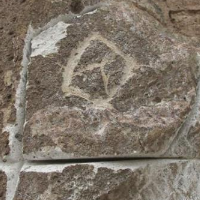Ancient Native American Petroglyphs Ripped from Remote California Cliffs
 (photo: Greg Haverstock, Bureau of Land Management)
(photo: Greg Haverstock, Bureau of Land Management)
At least six ancient stone carvings known as petroglyphs―considered sacred by Paiute/Shoshone tribal members―were hacked, sawed and ripped from cliffs by thieves in the Eastern Sierra Mountains outside Bishop, California. Dozens of other petroglyphs were also damaged.
The vandalism and theft of art believed to be more than 3,000 years old stunned the community and federal officials, and raised questions about the security of hundreds of such carvings scattered on public lands managed by the federal government. The theft was discovered October 31 along a half-mile stretch of cliffs in a remote area. About a quarter of the site was torn up.
“I think it’s akin to someone going and cutting pieces out of the Wailing Wall,” Greg Haverstock, archaeologist for the U.S. Bureau of Land Management in Bishop, told NBC News. Native Americans consider the area sacred and still conduct prayer rituals there. The site was added to the list of National Register of Historic Places in 2000.
“We still use this sacred place as a kind of church to educate tribal members and children about our historical and spiritual connections,” Paiute tribal historic preservation officer Raymond Andrews told the Los Angeles Times. “So, our tribal elders are appalled by what happened here.”
Petroglyphs are created by chipping into the dark surfaces of rock with a harder stone. That exposes the inner rock, which lacks the darker oxidation of the exterior, and provides a contrast that makes the designs visible. They differ from pictographs, which are painted on the rock.
The carvings depict an earlier Native American culture of hunters and gatherers believed to date back 8,800 years in a region known as Volcanic Tableland. The designs include renderings of deer, rattlesnakes, bighorn sheep, hunters with bows and arrows, and more abstract images like concentric circles, scribblings and random peck marks.
Although there have been random acts of petroglyph vandalism in the area over the years, Haverstock said, this was by far the worst assault ever. Another spokesman for the bureau, David Christy, told Reuters the thieves would have needed ladders, concrete-cutting saws and a power generator. The largest of the petroglyph panels removed was around 20-by-40-by-6 inches.
The job would not have been easy, but it is not expected to net the thieves much money. Authorities said one of the petroglyphs would probably be worth between $500 and $1,000 on the black market.
The bureau posted a $1,000 reward for information leading to the arrest and conviction of the thieves. The crime is a felony, but the punishment is limited to a maximum year in jail and $20,000 fine for first offenders.
-Ken Broder
To Learn More:
Petroglyph Thefts Near Bishop Stun Federal Authorities, Paiutes (by Louis Sahagun, Los Angeles Times)
Theft of Sacred Rock Drawings Stuns California Tribe, Federal Officials (by Kari Huus, NBC News)
Thieves Steal 3,500-Year-Old Rock Etchings from Sacred Native American Site in California (by Philip Caulfield, New York Daily News)
Petroglyphs of the Volcanic Tablelands: Bishop, California (Sierra Web)
- Top Stories
- Unusual News
- Where is the Money Going?
- Controversies
- U.S. and the World
- Appointments and Resignations
- Latest News
- Musk and Trump Fire Members of Congress
- Trump Calls for Violent Street Demonstrations Against Himself
- Trump Changes Name of Republican Party
- The 2024 Election By the Numbers
- Bashar al-Assad—The Fall of a Rabid AntiSemite






Comments